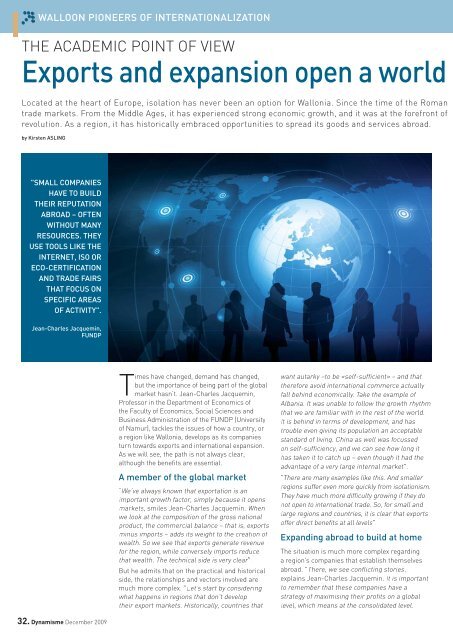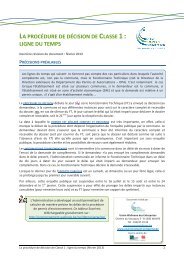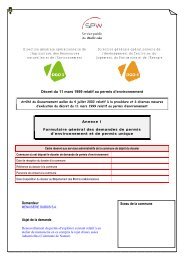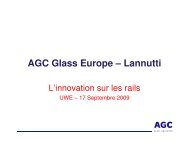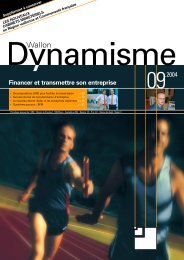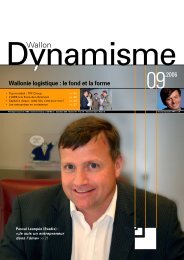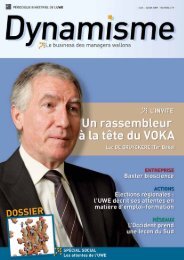EC_Abonnement_soyez de ceux qui_A4.qxp - Union Wallonne des ...
EC_Abonnement_soyez de ceux qui_A4.qxp - Union Wallonne des ...
EC_Abonnement_soyez de ceux qui_A4.qxp - Union Wallonne des ...
Create successful ePaper yourself
Turn your PDF publications into a flip-book with our unique Google optimized e-Paper software.
WALLOON PIONEERS OF INTERNATIONALIZATION<br />
THE ACADEMIC POINT OF VIEW<br />
Exports and expansion open a world<br />
Located at the heart of Europe, isolation has never been an option for Wallonia. Since the time of the Roman<br />
tra<strong>de</strong> markets. From the Middle Ages, it has experienced strong economic growth, and it was at the forefront of<br />
revolution. As a region, it has historically embraced opportunities to spread its goods and services abroad.<br />
by Kirsten ASLING<br />
"SMALL COMPANIES<br />
HAVE TO BUILD<br />
THEIR REPUTATION<br />
ABROAD – OFTEN<br />
WITHOUT MANY<br />
RESOURCES. THEY<br />
USE TOOLS LIKE THE<br />
INTERNET, ISO OR<br />
<strong>EC</strong>O-CERTIFICATION<br />
AND TRADE FAIRS<br />
THAT FOCUS ON<br />
SP<strong>EC</strong>IFIC AREAS<br />
OF ACTIVITY".<br />
Jean-Charles Jacquemin,<br />
FUNDP<br />
Times have changed, <strong>de</strong>mand has changed,<br />
but the importance of being part of the global<br />
market hasn’t. Jean-Charles Jacquemin,<br />
Professor in the Department of Economics of<br />
the Faculty of Economics, Social Sciences and<br />
Business Administration of the FUNDP (University<br />
of Namur), tackles the issues of how a country, or<br />
a region like Wallonia, <strong>de</strong>velops as its companies<br />
turn towards exports and international expansion.<br />
As we will see, the path is not always clear,<br />
although the benefits are essential.<br />
A member of the global market<br />
"We’ve always known that exportation is an<br />
important growth factor, simply because it opens<br />
markets, smiles Jean-Charles Jacquemin. When<br />
we look at the composition of the gross national<br />
product, the commercial balance – that is, exports<br />
minus imports – adds its weight to the creation of<br />
wealth. So we see that exports generate revenue<br />
for the region, while conversely imports reduce<br />
that wealth. The technical si<strong>de</strong> is very clear".<br />
But he admits that on the practical and historical<br />
si<strong>de</strong>, the relationships and vectors involved are<br />
much more complex. "Let’s start by consi<strong>de</strong>ring<br />
what happens in regions that don’t <strong>de</strong>velop<br />
their export markets. Historically, countries that<br />
want autarky –to be «self-sufficient» – and that<br />
therefore avoid international commerce actually<br />
fall behind economically. Take the example of<br />
Albania. It was unable to follow the growth rhythm<br />
that we are familiar with in the rest of the world.<br />
It is behind in terms of <strong>de</strong>velopment, and has<br />
trouble even giving its population an acceptable<br />
standard of living. China as well was focussed<br />
on self-sufficiency, and we can see how long it<br />
has taken it to catch up – even though it had the<br />
advantage of a very large internal market".<br />
"There are many examples like this. And smaller<br />
regions suffer even more <strong>qui</strong>ckly from isolationism.<br />
They have much more difficulty growing if they do<br />
not open to international tra<strong>de</strong>. So, for small and<br />
large regions and countries, it is clear that exports<br />
offer direct benefits at all levels".<br />
Expanding abroad to build at home<br />
The situation is much more complex regarding<br />
a region’s companies that establish themselves<br />
abroad. "There, we see conflicting stories,<br />
explains Jean-Charles Jacquemin. It is important<br />
to remember that these companies have a<br />
strategy of maximising their profits on a global<br />
level, which means at the consolidated level.<br />
32. Dynamisme December 2009


